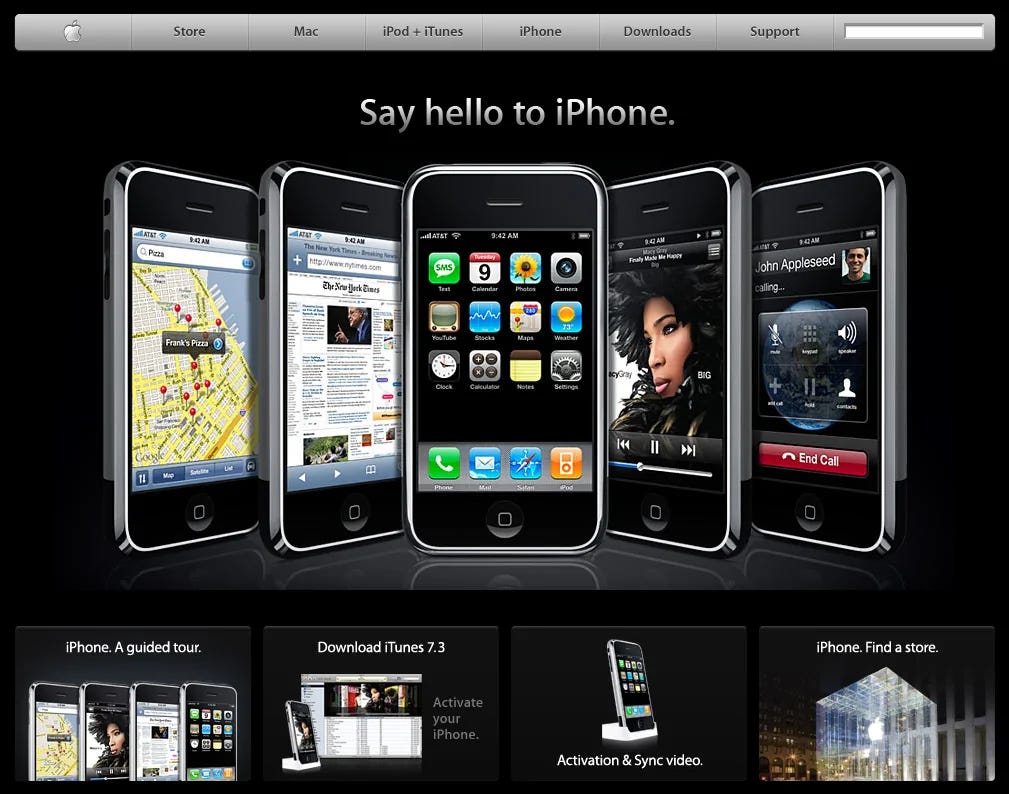Issue № 71 | London, Sunday 12 February 2023
Read on to learn why:
① Choice isn’t always a good thing. Especially when it comes to websites.
② Your website should be generating leads for you constantly.
③ Public markets constrict long-term strategy.
④ Central bank digital currencies are inevitable.
⑤ The front door to the internet is, once again, up for grabs.
⑥ Trust builds trust.
⑦ Content marketing should remain near the top of your list.
What's new
Apple tweaked the design of its website this week. It’s now a mess. BGR reports.

In short:
“Apple’s main website might look the same at first glance, but the company is rolling out a major design change by adding dropout menus with quick links to more details on each category of products. With that, the company highlights the name of its main products once you pass your mouse through a category.”
“Previously, Apple’s website was static, so you needed to click on a product in the menu bar to see more details. Now, with dropout menus, you can click exactly on the item you want to see at once.”
“The company also tweaked Apple’s website design for iPhone users, as the navigation menu is now on the upper-right side of the screen. In addition, new animations appear when you select a product.
Apple’s new website is full of little tweaks that improve the navigation for shoppers.
Why it matters
Almost everything Apple does matters to marketers because the company is such a benchmark of quality. And, whatever type of business you run, your website is the most important marketing asset you have. It’s your shop window, the embodiment of your brand on the internet, and - whether you transact on it or not - the source, directly or indirectly, of the bulk of your revenue.
I’m not a designer but I am an avid website user. So are you. We all are. I’m also a long-time Apple addict so I know how its product portfolio and website have evolved. It won’t surprise you to hear that as the former has become bloated and difficult to navigate over the years, so has the latter.

I miss the simpler days. Yes, I know, the company and its product lines are exponentially larger than when they launched the iPhone more than 15 years ago. But just because your product or service is complex, doesn’t mean your website needs to be. Indeed, I’d suggest the more complex what you’re selling is, the easier your website should be to use.
① Consider the data. 90% of users leave a website because it’s poorly designed and 94% of people say web design is the reason they mistrust a website. Apple’s attempt to help their users has on this occasion, to my eyes at least, confused them. But that’s a hallmark of the Cook era vs the Jobs one. Cook likes to offer choice; Jobs never did. And I’m with Steve on this one.
What to do about it
Take action
② Is your website working as hard for you as it should be? Run a critical eye over it this week and, as you do so, consider this:
Mobile first: You likely don’t but most people will browse your website on their mobile device (75% in fact, according to Google). Make sure it works just as well on a phone as it does on your desktop.
Function, not form: Don’t let designers tempt you with ‘courageous’, ‘standout’ design that will confuse your users. There’s nothing wrong with familiarity. Make it intuitive to use, not original.
Attract: Search is changing fast (as you’ll read later in this issue) and in the future, even more so than today, the best way to be found on the internet will be to publish compelling content. Make sure you’re doing so.
Calls to action: Make it clear to your users what they should be doing next. Every part of your site should have a clear and visible ‘call to action’, leading users to the next stage in their journey there, ultimately getting them to our final consideration…
Lead generation: Never forget why you built the site in the first place. Its purpose is to generate revenue. That means that every page should be gently qualifying prospects and driving the ones that fit towards giving you their contact details or buying. Your website should be generating leads 24/7.
Get help
Visit InMarketing, my resource library for leaders in finance or technology who want to innovate, interact and influence.
Join the InMarketing community, either on Twitter or on Substack (you’ll need to download the Substack app and head to the chat tab). Either way, you can ask questions of me and fellow senior marketing practitioners.
Help me
If you found this useful or know someone who would, please share it. It would really help me to grow the community of regular IMTW readers.
Top stories
The other articles that are worthy of your time.
FINANCE
Why Rothschild is calling time on the public market
③ Public markets constrict long-term strategy.
“On Monday, Alexandre de Rothschild, the 42-year-old seventh-generation leader of the European banking dynasty, launched a €3.7bn deal to take the Anglo-French institution private — his highest-stakes move since taking over the bank five years ago. ‘Our DNA is much better suited to being a private company,’ de Rothschild told the Financial Times.”
“Delisting Rothschild & Co would buck a trend among its boutique investment banking peers — such as Evercore, Lazard and PJT Partners — which have all floated in the US and followed in the footsteps of Goldman Sachs’s landmark initial public offering in 1999.”
“Internally, frustration was growing that its strong operational performance — all three businesses had a record year in 2021 and overall revenues grew 11 per cent year on year in the first nine months of last year — was not adequately reflected in its share price performance. […] The family thought the listing brought Rothschild & Co no real benefits and its leadership saw an inherent contradiction in a public company held captive by quarterly reporting advising clients to think long-term.”
TECHNOLOGY
Bank of England takes first steps towards digital pound with consultation
④ Central bank digital currencies are inevitable.
“The Bank of England has taken its first steps towards creating a new form of currency after beginning a consultation on the introduction of its own digital pound. The consultation, which has been launched in conjunction with the Treasury, sets out proposals on how the digital currency would operate and invites businesses and members of the public to review its design and implementation.”
“A digital pound would be issued by the Bank of England and could be used by households and businesses for everyday payments in-store and online. The currency would be interchangeable with cash and bank deposits, complementing existing cash payments. It wouldn’t be intended for savings and would not pay interest.”
“Neither the Government nor the Bank would have access to personal data and holders would have the same level of privacy as a bank account, according to the central bank. Governor of the Bank of England, Andrew Bailey, said: ‘As the world around us and the way we pay for things becomes more digitalised, the case for a digital pound in the future continues to grow. A digital pound would provide a new way to pay, help businesses, maintain trust in money and better protect financial stability’.”
MEDIA & MARKETING
The battle for internet search
⑤ The front door to the internet is, once again, up for grabs.

“By the end of January, two months after its launch, ChatGPT was being used by more than 100m people, making it the ‘fastest-growing consumer application in history’, according to UBS. […] ChatGPT can synthesise knowledge from the web: for example, listing holiday spots that match certain criteria, or suggesting menus or itineraries. If asked, it can explain its reasoning and provide detail. Many things that people use search engines for today, in short, can be done better with chatbots.”
“Can chatbots be trusted, and what do they mean for search and its lucrative advertising business? Do they herald a Schumpeterian moment in which AI topples incumbent firms and elevates upstarts? The answers depend on three things: moral choices, monetisation and monopoly economics.”
“Can tech firms make money from this? Charging advertisers more for the ability to influence the answers that chatbots provide, perhaps, or to have links to their websites embedded in responses. Ask ChatGPT to recommend a car, and it will reply that there are lots of good brands, and it depends on your needs. Future chatbots may be more willing to make a recommendation. But will people use them if their objectivity has been compromised by advertisers? Will they be able to tell? Behold, another can of worms.”
WILDCARD
How leaders build trust
⑥ Trust builds trust.

“Trust must go both ways. In companies where employees feel their CEO trusts them, 87% trust the CEO in return. In companies where employees do not feel trusted, this proportion is 27%. […] Motivation comes from having autonomy, mastery and purpose. Any leader who fails to enable these three things for their staff will suffer, both in terms of their own trust levels and in the performance of their organisation.”
“There is no surer way of breaking trust in leadership than through mistreating those who work for you. ‘What diminishes trust very quickly,’ says Ajaz Ahmed, CEO of innovation agency AKQA, “is when people in leadership or management positions demean or disrespect colleagues.”
“Leaders can break trust by having double standards, employing the ‘do as I say, not as I do’ maxim, says BlackBerry’s CTO, Charles Eagan, or by failing to live up to the high demands of a C-suite role. ‘Sometimes you lose trust by not making the tough calls.’ One of the most challenging aspects of being a business leader is the unavoidable fact that you may not be able to keep every promise or deliver on every plan. Mishandling these events is a surefire way to break trust.”
Off cuts
The stories that almost made this week’s newsletter.
FINANCE
🌍 NatWest pledges to stop providing loans for new oil and gas projects
🧀 Credit Suisse at a make-or-break moment
👩🏻💼 Citi hires ex-Sanlam Private Wealth boss Penny Lovell
🇨🇳 Morgan Stanley gets full ownership of Chinese joint venture
🧬 Standard Chartered Bank names new group chief transformation officer
TECHNOLOGY
⛓️ Visa eyes high-value USDC settlement payments on Ethereum
🇪🇺 Membrane Finance launches a regulated Euro stablecoin
🤖 Robo adviser Exo Investing shuttered after Abrdn scraps acquisition plan
💡 FCA sets up Innovation Advisory Group
🤑 Revolut debuts crypto staking
MEDIA & MARKETING
❤️ B2B brands can elevate their marketing by aligning with audience passions
🏢 Do you need a brand messaging framework?
🧑🏻💻 Zenus Bank appoints John Woods as chief revenue officer
📰 The NYT: Reports a 11% rise in revenue and builds a modern tech stack
🥇 Enter now for the Investment Marketing & Innovation Awards 2023
The last word
⑦ Parry Headrick, Founder of Crackle PR, on the upcoming shift in search:

“Content creators will *dominate* marketing and PR in the coming post-SEO world. Plan accordingly.”
Don’t settle for marketing.
Strive for InMarketing: innovate, interact, influence.
Wishing you a productive week,
P.S. Thinking about where to book for Valentine’s? I had supper at Sukho, my local Thai restaurant, this week. It’s one of London’s best.





